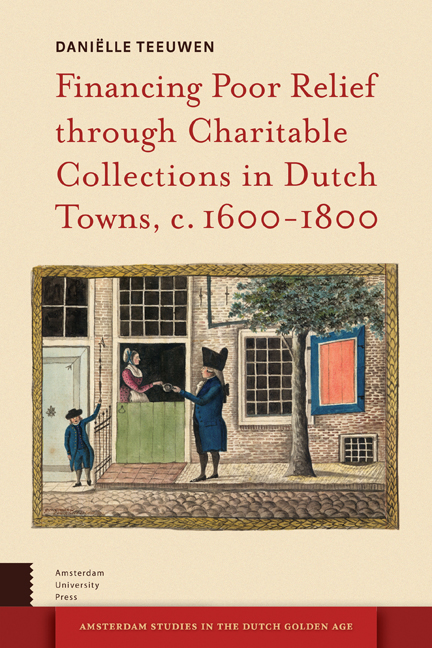3 - Financing Outdoor Poor Relief
Published online by Cambridge University Press: 10 December 2020
Summary
In the 1730s, the Zwolle City Poor Chamber experienced large difficulties in keeping its budget afloat. The urban authorities then decided upon an extensive investigation into the relief institution's finances, which was carried out in 1735. After inspecting the account books on both income and expenditure, as well as interrogating poor people supported by this charity, they concluded that the members of the City Poor Chamber had distributed alms ‘with very great prudence and even less extensively than the bad situation of several indigent came to require’. Thus, mismanagement as a cause of the financial troubles could be crossed off the list. Instead, the explanation was sought in ‘the diminutive gifts and alms that are daily given’, as well as in ‘the number of destitute that due to the slackening of several crafts, and then especially of button making, are daily rising’. While the revenues of the church and public collections combined had yielded almost 7,100 guilders in the previous years, now only 6,345 guilders were collected. At the same time, expenditure on weekly distributions had increased from some 10,900 to about 11,250 guilders. Except for rising poverty and declining generosity, the fact that the yearly subsidy of 800 guilders imposed on the Catholics had not been paid since 1725 was also mentioned as an explanation for the budgetary troubles. As a result, the City Poor Chamber now ran short an amount of 4,500 guilders a year. The town council did not offer an immediate solution, except for deciding to put more pressure on the Catholic clergy to pay the subsidy, as well as proposing some minor policy changes which would help the almoners to cut back their expenditure. A more drastic approach to solve the relief institution's financial problems came in 1739, when the Catholics were excluded from assistance.
In this report on the income and expenditure of Zwolle's City Poor Chamber, several key aspects that are discussed in this chapter come together. To start, it provides insight into the role of municipalities in the financing of poor relief, in that they functioned as supervisors and regulators, especially regarding civic charities. Moreover, it demonstrates the importance of collections as a source of income for relief institutions. In most years, the Zwolle City Poor Chamber depended for about half of its revenues on charitable appeals in the churches and in the streets, and in case the population's generosity declined, this could immediately cause troubles. Furthermore, the rising expenditure mentioned as an explanation for the charity's financial shortages was a phenomenon with which many relief institutions struggled in the eighteenth century.
- Type
- Chapter
- Information
- Publisher: Amsterdam University PressPrint publication year: 2015



